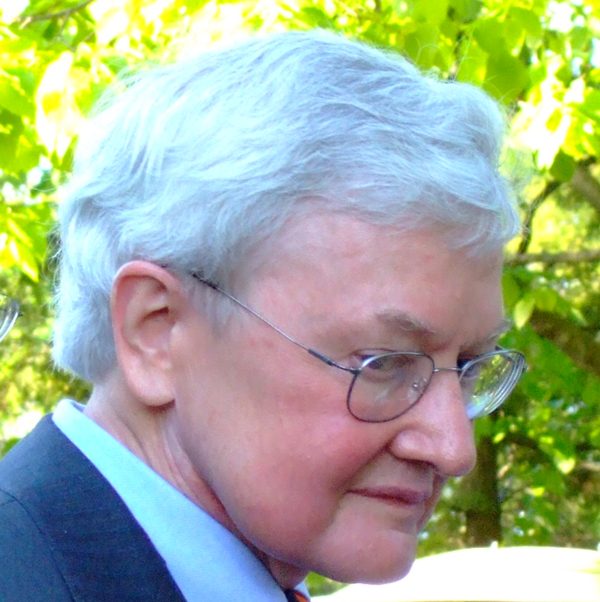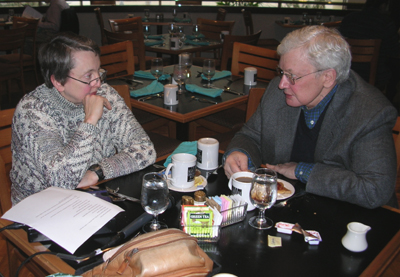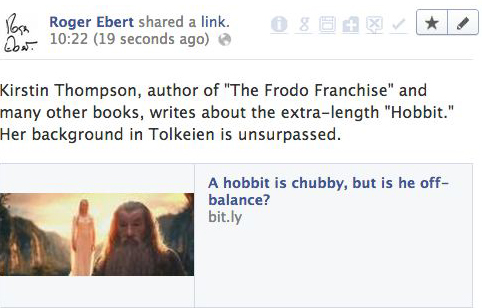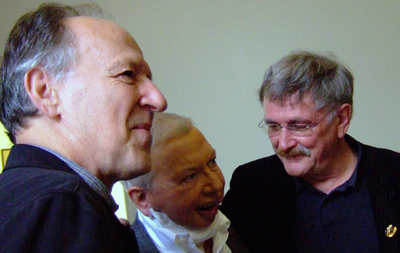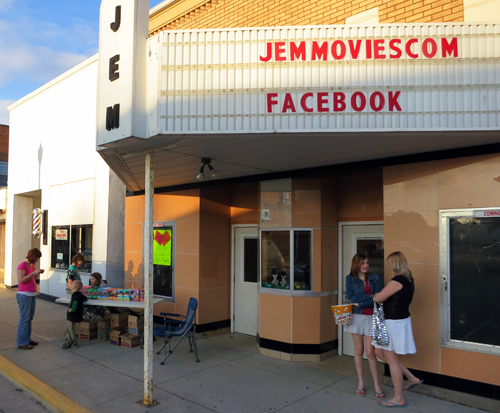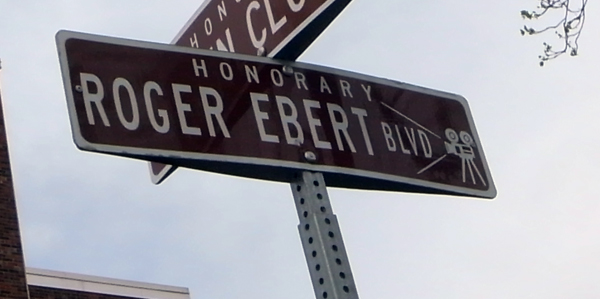Cheers, R.
Wednesday | April 10, 2013 open printable version
open printable version
We owe Roger an enormous debt. Since we met in 1999 at the Arts Club of Chicago, Roger has been the most generous and eloquent supporter our work has had. In our visits to their festival, Roger and Chaz welcomed us into their community and introduced us to people who have become good friends. Roger came to our Wisconsin Film Festival twice, and his presence gave it a burst of energy. In Roger and Chaz we found a couple engaged passionately in the act of living in, and for, each other.
Our larger debt is to the lessons Roger taught us, and thousands of others: Writing about film can exemplify writing about life. Friendship and good humor must inform everything you do. Punishing health problems need not kill your appetite for experience, for fellowship, and for the life of the mind.
In Roger’s memory, each of us offers some personal reflections.
Kristin here:
As with so many other people, my first acquaintance with Roger was through his and partner Gene Siskel’s television review shows. I’m not sure when David and I started watching. At first we were partly attracted by the fact that each review included a clip from the movie. TV reviewing was such a new form that the studios didn’t put together montages of shots to provide the reviewers. You got to see an actual scene as it appeared in the film, something that could give you a sense of whether or not you wanted to see the film. Later the edited-together shots from various parts of the film came to be more like a trailer than a sample. They don’t tell you much about the film. But Gene and Roger did, so we kept watching.
We noticed the fact that Gene and especially Roger would often promote films that were in release but not likely to be known to most of the show’s viewers. Small independent films and foreign films, which the pair urged people to try and see in theaters or, increasingly, on video. These were the same sorts of films that became the core of Roger Ebert’s Overlooked Film Festival. Few reviewers writing for a mass audience have bothered regularly to call attention to worthy independent and art-cinema fare.
When we met Roger in the late 1990s, the first thing that struck me was that in person he seemed exactly the same as on TV. On the air he didn’t put on a public persona or try to entertain us at the expense of giving us less information about the film in question. Those were the early days of the infotainment boom. As its name suggests, infotainment coverage means that the reporters and reviewers feel obliged to be as entertaining as the news (or pseudo-news) they present. I think of another reviewer in the early days, Gene Shalit, who started out presenting reasonably informative review segments on the Today Show. Increasingly, however, his eccentric appearance, with large, frizzy hair and an oversize mustache, combined with his breezy, pun-filled delivery made his segment into a sort of comic interlude that barely qualified as a film review. In other words, the opposite of Roger.
Over the next several years, David got to know Roger better than I did. He helped squire Roger around during his 2003 visit to the Wisconsin Film Festival and wrote introductions to his books. I was in the early years of working on an Egyptian archaeological expedition, and in 2003 I was struggling to get my big project on the Lord of the Rings franchise (published as The Frodo Franchise in 2007) off the ground.
During that time I managed to go with David to the Overlooked Film Festival and enjoyed it very much. There Roger’s zeal for introducing general audiences to relatively obscure films was boiled down to its essence. The enthusiasm of the loyal attendees was contagious, as was Roger’s joy in sharing his love for the films and giving the audience access to the stars and filmmakers who were his friends.
From 2003 to 2006, I was dashing around the world, interviewing people in New Zealand, Los Angeles, Silicon Valley, London, Copenhagen, and elsewhere for my book. By the spring of 2006 I had talked with 75 people and acquired the knowledge I need to write most of my chapters. Game producers and designers filled me in on the video-game aspect of the franchise; festival-heads and distributors enlightened me on the impact of the trilogy on the international independent film market.
But there was a crucial piece of the puzzle missing. My fourth chapter was to be on the rise of modern infotainment journalism, covering such topics as press junkets, the replacement of paper press kits replaced with EPKs (electronic press kits), and the rise of making-of promo films on cable. I knew how press junkets work, with their endless strings of short interviews where the reporters ask the same questions over and over–and the fact that studio employees did the filming and editing of the interviews. I had talked to cast and crew members about the Lord of the Rings junkets. (Ian McKellen: “Someone will come forward and say, ‘I know you get asked all sorts of questions. I’m not going to ask you the questions everybody else asks you, so I’m going to say, “What is the question that you’re most asked?”‘”) But I didn’t know much about how such things got established historically or how they looked from the viewpoint of the journalist interviewer. Unfortunately, nobody had written a history of press junkets.
It occurred to me that Roger was an expert on such subjects. His career as a reviewer got going in the mid- to late 1960s, when the studios were increasingly using press junkets, and he had not only witnessed but participated in the expansion of film coverage from print into television. Roger happened to be slated to visit the Wisconsin Film Festival in the spring of 2006. I asked him if he would be willing to let me interview him on such topics. Despite a heavy schedule, he agreed. The only time he could fit me in was over breakfast on April 2. I went to his hotel and talked with him for about half an hour. (David came to pick us up and snapped the photo above; my recorder is under the list of questions I had concocted. Roger has toast and coffee, back in those happy days when he could still eat.)
The result was everything I could have hoped. With his razor-sharp memory, Roger gave me invaluable historical information and insights. For example, I asked why reporters ask questions to which they already know the answers:
Because the sessions are so short, and because the nature of television is that you have to get them to say it. They get pretty stupid questions. For example, I may well know who Hilary Swank plays in Million Dollar Baby, but it doesn’t work on television unless she says, “I play a woman who wants to be a boxer.” You have to have her saying it. So you say, “Well, tell me about this character you play.”
It was a delightful and fruitful interview, supplying that last piece of the puzzle. It also happened to be the last interview I did before finishing the book a few months later and sending the manuscript to the press.
That June, Roger had his disastrous health crisis, ending up in a coma until August. Of course, he lived on to give us a tremendous amount of insightful writing on film and his own life and his view of the world in general. But I was very grateful to have had that interview with him while he could still speak. As anyone who has done much live interviewing knows, it’s very different from interviewing by email. The conversation takes unexpected turns and generates questions that weren’t on the original list. I’m still thankful for that interview, not just for the selfish reason that it enhanced my book. I’m also glad that I got some of the valuable information that Roger had in his memory but had never included in his voluminous writings. He was a living document of modern film history, and inevitably much of what he knew never got written down. At least I captured a bit of it.
I think that interview gave Roger a better sense of me as a film scholar. We also happened to start this blog later that year, in late September. I doubt that Roger had time to read every entry, but he read many of them and helped get the blog established by linking to it. We didn’t like to pester such a busy man, but we notified him when we posted something that we thought related to his interests. (My skepticism about 3D matched his, for example.) Here’s the last time he linked to one of my entries, with his characteristic generosity and the occasional typos that resulted from the speed with which he poured out his thoughts on FaceBook and twitter:
I think he must also have realized that, despite the fact that our interview was on a recent blockbuster franchise, one of my specialties is silent cinema. I got invited to the 2007 Overlooked Film Festival to be one of the “expert group of colleagues” who were to help fill in for Roger during his recuperation. I introduced Raoul Walsh’s Sadie Thompson and after the screening was on the panel that chatted with the three members of the Alloy Orchestra.
In 2008 the event changed its name to what most of us called it already, Ebertfest. I was now sort of the unofficial silent-film expert. I got to introduce a luminous print of von Sternberg’s Underworld, which I had never seen in 35mm, and to lead the post-screening discussion with the Alloy members. (My program notes for the event are here.) The same thing happened the following year with The Last Command. It’s a pity that the Alloy team never accompanied Docks of New York at Ebertfest, completing the survey of von Sternberg’s trio of silent masterpieces.
I missed the 2010 festival, needing to be at the site of Tell el-Amarna for my Egyptology work. But I returned in 2011 to introduce and discuss a screening of the nearly complete version of Metropolis, recently restored.
In 2012 I again needed to be in Egypt during Ebertfest, so the 2011 festival was the last time I saw Roger in person. But we kept in contact by email. That could be a delightful process, as David shows in the second half of this entry.
DB here:
Werner Herzog, Roger Ebert, and Paul Cox, Ebertfest 2007.
From different perspectives, I’ve set forth my sense of Roger’s contribution to film culture. On this site we’ve covered Ebertfest over the years, and I reviewed Life Itself. In addition, the University of Chicago Press has generously made my introductions to Awake in the Dark and The Great Movies III available online (here and here). After Roger’s death last week, I wrote a brief tribute for the UW Antenna site. Still to come is a valedictory piece for Film Comment, to be available in print and online.
So today, when Roger is ceaselessly on our minds, I thought: Why would anyone want to listen to me when they could listen to him? You can hear (and watch) him in the vast video archive of Siskel & Ebert. But maybe I can bring you his voice in another way.
Combing through a decade’s worth of emails, I found some bits that seem worth sharing. A subject line “From Roger” always marked an email worth reading, and the inevitable sign-off, “Cheers, R.,” left you wanting more. I can hear him speaking these words, even in the years when he had no voice. Maybe you will too.
Apparently almost all G-rated animation will now be in 3-D! I hear IMAX will show nothing but 3-D (via digital). No more celluloid! Traditional IMAX process is dead. The vulgarians are at the gates. (2008)
Have you seen Chop Shop? I’m showing it at Ebertfest. Sort of an American indie neorealist picture. And in 70mm, a new print, Baraka. Best Blu-ray I’ve ever seen. Most critics liked Coraline even more than I did. (2009)
Just saw Ponyo. The opening undersea sequence is miraculous. Manohla Dargis was right about Perfect Getaway: A good B movie. (2009)
I hated Les Miz, of course. Falling dirges, rising dirges, ditties, boilerplate. (2013)
I am often guilty of getting carried away by films that will not stand the test of time, although I do think that The Dark Knight will continue to be interesting. (2009)
I always said I would not retire until I had a book about Scorsese. Now I do, and I can’t retire until I have one about Herzog! (2008)
I remember Scorsese saying he watched Black Narcissus at least once a day for a week. (2012)
[I wrote that Donald Richie was recovering his health:] So I hear! Walking around the room, likes the new place with English-speaking help, health on the mend. What a dear man. His film of The Inland Sea is wonderful but the book and his Journals are really special. So honest and matter of fact. (2010)
[On images in a blog entry on Andrew Sarris:] How moving it was to see the photos of old friends like Arthur Knight and Hollis Alpert. Remember when the Saturday Review was eagerly awaited? I met Arthur and Marianne in 1968, on the notorious Warner/Seven Arts week-long junket which flew planeloads of critics to the Bahamas. I was a kid. They immediately invited me to their home and through them I met many Hollywood figures.
God, Arthur loved his pipe, and his sacramental martini formula. I never drank a martini except at his house, and there nothing else. The way he made one approached the psychedelic. Marianne was a costume designer. . . . They bought a house on the beach at Malibu when such things could be had for less than millions. Their Saturday open houses were gatherings of interesting people, including some (like Blake Edwards’ doctor) later immortalized in films. (2012)
[In the midst of Ebertfest, Roger took time to write:] I’ll write more later….but be sure to buy the News-Gazette before you leave town. There’s a wonderful photo of Kristin, Richard [Leskovsky], and Nina [Paley] (2009).
[When I posted this entry about the Jem movie theatre in Harmony, Minnesota, Roger commented on this picture.]
That photograph, seemingly so artless and matter-of-fact, speaks deeply to me. The color, the shadows, the girls in conversation. (2012)
Chaz and I are at Cannes, I having survived the trip in surprisingly good shape. Lots of big names, but as Frémaux says, “They have to prove themselves every time.” (2009)
In high school, I went to popular movies with dates and attended the Art Theater mostly alone. In college there was a period when I sort of stopped going to popular movies—more art films and film societies. (2011)
I have a lifelong policy of never making lists of anything except my annual Best 10. Can’t tell you how much time I saved by not compiling Halloween movie lists. (2011)
I am so happy the festival is approaching and Kristin and you and I can sit again in the same room with good movies. (2010)
[When I replied that Kristin couldn’t attend that year because she was needed for her archaeological dig in Egypt: ] And my Egyptian correspondent Wael Khairy will be in Urbana! So the balance of the earth won’t be altered. He is a very gifted film critic. . . . He has two more weeks to wait until the ban on his writing is lifted. It was imposed after he led a (successful) effort against the censors to remove the Arabic subtitles from the CENTER of the screen on Avatar. (2010)
[On the musicians in Woodstock:] I, like you, was not focused on rock in the 1960s. I had to ask Chaz who some of the performers were. These days, I know nobody. (2009)
Do you remember that nice Indian kid sitting next to you at Ebertfest? I met him through my blog when he was 15. He had been making films since he was 6. His father was going to accompany him…but unexpectedly died shortly before. His dad approved of the visit, so Krishna came with his lovely mother and sister. I love this kid. (2012)
You know where the Westerns have gone for an audience? Video games, that’s where…as long as you look for the right type of western. John Wayne. John Wayne. I think it was Montaigne who said: “Everyone needs a name like that.” (2009)
[I wrote him that watching movies is good, but maybe reading is better:] You know, I think I agree with you. I doubled my “reading” by adding audiotapes of books that don’t call out to be intensely read. I’ve listened to about 100. The single most spellbinding performance I’ve heard is Sean Barrett doing Perfume. (2008)
[I sent him a link in which David Brooks returns from an expedition into the Midwest, recalls his admiration for White Castle, and declares his new preference for Steak ‘n Shake]: Yeah, but he strays off the point pretty quickly. And I don’t know anyone who prefers White Castle to S ‘n S….although late boozy nights in my 20s often called for a bag of sliders. Californians are passionate that In ‘n Out makes better burgers than Steak ‘n Shake. I contend that the very names of the two chains dramatically contrast the styles of sexual intercourse in the two regions. (2012)
I have been honored out! Above all I need to focus on writing. Sounds harsh, but everything’s an effort these days…. (January 2013)
[The University of Chicago Press sent him my Foreword to Awake in the Dark and he replied]: I felt as if, after 38 years of plugging away, someone had understood just what I have been trying to do. I work for a newspaper, I get categorized as a newspaper reviewer. I am proud to be one. But I have also tried to stretch the limits of the form. I think of myself as being a teacher as much as a writer, and I like my forum because it gives me a lot of readers. . . .
That you mentioned Shaw took my breath away. I have been reading Shaw for 40 years, starting by reading every one of his Prefaces, from which I learned that it is quite all right to stray entirely from the subject, or approach it from an unexpected angle. In the last few months I’ve been reading his collected music criticism. I don’t know a thing about music, but that was an advantage, because I was able to focus on his language and strategy. His use of paradox and under- and overstatement is audacious, and I like the way he states even his most extreme positions as if they are simple common sense. (2005)
The last message I got, on 15 March 2013, referred to the 2013 Ebertfest schedule. It contained only one word.
Hooray!
Cheers, R.
On the block adjacent to the Virginia Theatre, off South State Street, Champaign, Illinois.












